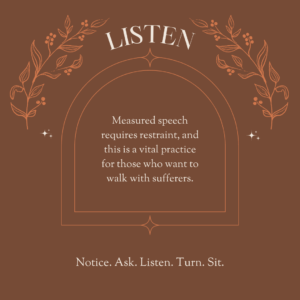
Among the worthy goals of a church that aspires to be healthy is a climate where suffering people are well cared for. It’s not the only goal, but it mustn’t be minimized among a people who are to be known by their love (John 13:35). We’re taking a few weeks to discuss what that might look like. I should note that what we are doing here is just that – beginning a discussion about the graces and practices that are present among a people who desire to walk with those in real difficulty. Two weeks ago, we asked you to keep your eyes open for those in your community who need care. Last week, we urged you to begin praying that God would deepen your love for those around you. Today, I’d love for us to consider a skill that, for many of us, is either under-developed, sorely neglected, or atrophied altogether – the practice of focused listening.
In the early years of our marriage, the Lord mercifully exposed this as an unconsidered (and therefore unaddressed) sin tendency which was adversely affecting how I cared for Bridget. Frankly, I was just a terrible listener. My habit – and I don’t think I’m unique in this regard — was to listen just long enough to find out what we were talking about. Then, I’d cue up my response. If we’re discussing fear or greed or parenting or ingratitude, I’d just pull out my mental “file” on whatever the topic of the day was and start talking. I know things about parenting. I was parented. I’ve done a little myself. I’ve observed good parents and bad parents. I can quote Scriptures on the topic. I’ve read Tripp, Fitzpatrick, and Furman. I have thoughts on this topic. The unfortunate result of this pattern was that I tended to miss what really needed to be considered because I failed to take the time to really listen. Aside from being ineffective, it was dishonoring. Someone has said, “Those who won’t listen will eventually be surrounded by people with nothing to say” and that’s a prospect we all want to avoid. Solomon said, “to answer before listening — that is folly and that is shame”.
James also gives us something pertinent in the first chapter of his book. “Know this, my beloved brothers: let every person be quick to hear, slow to speak, slow to anger.” (James 1.19) That three-fold injunction could prove instructive for all those who want to communicate wisely and well, but that middle phrase is especially striking to me.
Slow to speak.
It takes discipline to rein in our words. I’ve heard someone describe a talkative man this way: “He speaks 10 words a second with gusts up to 50.” We all know this.
Measured speech requires restraint and this is a vital practice for those who want to walk with sufferers.
I asked my daughter, Katie, who has made this a focus of study for years, to contribute to this discussion. She immediately highlighted the importance of gentleness and time – asking questions, going slow, pressing in, restraining your words, hearing their story. Her advice: “Don’t be afraid to spend time asking about the specifics of what the struggle is like. It’s healing for someone to feel known.” I think she’s right. Years ago, I heard a couplet from an anonymous poet:
His thoughts were slow; his words were few (and never formed to glisten).
But he was a joy to all his friends; you should’ve heard him listen.
There is so much to consider on this topic – practical habits like eye contact and nonverbal feedback, useful tools like well-thought-out, open-ended questions, cultivating a sensitivity regarding where to probe and where not to, etc. David Powlison has a worthwhile CCEF Journal article (from many years ago) that can help you strengthen that muscle. In any event, a growing love for neighbor will surely stir in us a desire to hear them. So, if verb #1 was “notice” and verb #2 was “ask”, let’s make verb #3 “listen”. Incidentally, you show me a church that notices people in crisis, is asking God for a growing love for others and is committed to disciplined listening, I’ll show you a church that is well on the way to serving those in sorrow.
